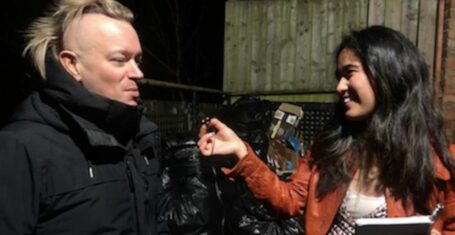
DDF’s Site-Specific Night Reviewed
Dave Spencer finds much to think about in the new writing offered on DDF’s site-specific night.
Satin
Old Shire Hall is an excellent choice of venue for this piece – a part Victoriana modern brothel immersive kitchen sink grit and grime drama. The exquisitely ornate Rotunda obviously meant that this was theatre in the round, which worked well for the majority but occasionally words were lost in the slightly echoing space. But how else are you going to stage something in a round venue?
The audience was instantly thrown into a role itself: being the audience at the brothel’s nightly show. We were accompanied by tuxedoed gentlemen and welcomed by brilliantly dressed girls awaiting us at the door.
The characterisation was superb from the outset, even down to one of my fellow audience members knocking over a wine bottle in the entrance, which was then tidied up and repositioned by Holly (Daisy Cummings) who is later revealed as the whore who is kept on the payroll because she cleans.
The script was compelling and highly naturalistic, often segments of conversation between the girls being lost due to the acoustics and overlaid nature of their dialogue. However, this only added to the fact that we, as an audience, were listening to private conversations between some highly stressed women.
There was lovely realism throughout the piece but I did feel that it was written with a slightly confused era in mind. The costuming and setting seemed to presume a Victorian or, dare I say it, ‘Moulin Rouge’ theme running throughout, but this was sadly not followed through in the turns of phrases used. However, I soon forgot this and enjoyed what was an, at times, darkly comic and gravely tragic performance.
The standout performance was certainly Grace Cheatle’s Elsie. Her responses and murmurs seemed as if they were completely spontaneous and unscripted. She endeared herself to the audience immediately with her cute characterisation and nervous laughter, which only made her inevitable corruption at the end of the production all the more depressing, where some tears from Steffi Walker, as Elsie’s aunt, were matched by a woman in the audience also crying. The girls in general were very convincing and all adhered to their characters well.
However I felt that Christina Ulfsparre, as the malicious Jenny, was the weakest member of the group, despite being the brothel’s stunning, occasionally Russian, showpiece.
Personally, I did not enjoy the sections of the show containing the male members of the cast, the visitors to the brothel. I would have preferred if the story had focused entirely on the girls and their reactions to situations that could have been happening offstage.
Spencer, played by James Hyde, was an exception as his character was completely necessary to the overall power play present in the plotline.
This first offering of DDF’s site-specific night was a worthy one and thoroughly enjoyed by all, despite the fact that we all left Old Shire Hall a touch downtrodden and contemplative.
Incognito
Among the rocks strewn with other rubbish on the black stage of the Assembly Rooms was a bottle of port, a recurring theme in Durham’s theatrical world, I have noticed. Whenever a bottle of booze is required, the port always comes to the rescue. I am not going to make stereotypes about the kind of students we are but it is not hard to see where I am going.
The opening was incredibly Christian. A preacher came in accompanied by cathedral choir voices, stood under a spotlight, and read a fairly lengthy monologue about God or something, which became a theme repeated throughout the show. While the play obviously centres on (or in) hell, I felt the use of Christian metaphor and reference to be heavy-handed at times and also occasionally incorrect or inconsistent. This was my main problem with the play. It over-moralised, something, which I never like theatre to do. The morals should be there for the audience to mull over, to pick out and then pick at. I don’t want a ‘Nazis are bad and so is dogma’ ethic thrust down my throat. I would like you to lead me to a place where I become a fascist for the duration of the play so that I can suddenly check myself and wonder how the hell I have been fooled out of my principles for forty or so minutes.
As well as this, the realist setting of the two school boys stood in contrast to the highly stylised interchanges between Shadow and Man, which owed a lot to Kafka’s The Trial in my view, rather than anything by Beckett. However, the metaphorical language of the sequence in hell leaked into the former, which jarred slightly.
Elizabeth Briggs, as Shadow, was a revelation. She spoke in a voice that was not dissimilar to Moaning Myrtle’s but struck the audience as immediately sinister and playful, toying with the emotions and anxieties of the Man (played by Ed Cherrie). She lithely hovered around the Man, darting in and out of his vision, all the time invisible to his eyes, but remaining a constant, haunting, and unnerving voice. The other actors, in comparison to Briggs lacked something by way of being unconvincing. But I think this may have been only due to the fact that Briggs was superb.
I love the idea that this piece was partially devised, and so I am wary of crediting any of the (on the whole good) direction exclusively to Idgie Beau or Michael McLauchlan, if only so that I do not steal someone’s idea from them and give it to another. The staging and blocking was simple and yet wonderfully effective, maintaining visually interesting levels throughout.
The ending, which had Shadow and Lukas (Michael Earnshaw) speaking in unison across the metaphysical boundary that separated them, confused me, but was nonetheless enjoyable. I do not really see what significance it had that these two characters were linked, but the double-voiced nature of the whole dialogue was a nice touch.
Incognito left me a little underwhelmed, if I’m honest. I think it tried to attain too much by dipping its toe into too many theological and philosophical ponds. Ultimately, it fell short and consequently ended up as some sort of hodgepodge of partially thought through ideas, the majority of which never came to glorious fruition.
Dead Letter Office
The first thing that struck me about this play based in the workshop of the Assembly Rooms was the incredible aesthetic. Letters were strewn over the floor (I dread to think how much it cost to buy them all or how many bills had to be dealt with) whilst three figures wearing steampunk goggles sat quietly, waiting to begin moving. The pipes and tired, painted walls of the workshop made the audience feel as if they were watching the action take place in an environment that was built to be temporary but that had sadly become permanent. It was simply brilliant.
William Hockedy’s Milton was dramatic and nicely caricatured. Pod, played by Jamie Kitson, was a loveable, sweet and naïve letter-sorter who we had great affection for from the outset. And Harriet Tarpy brought a wonderful pathos to the character of Eve. All three of these characters held their own, but the final interplay between Pod and Eve when they finally meet was simply beautiful. So many nuanced gestures and awkward shrugs and signs added an infinite amount to Gareth Davies’ already incredibly strong script, which was full to the brim of metaphors, as well as an almost pigeon-English, that may or may not have been learned by the letter-sorters from the very letters that they were sorting.
I’m not going to pretend that I understood the play entirely, there seemed to be a definite ‘Wall-E’ theme going on, but I enjoyed it immensely. The applause at the end was definitely the strongest of the night as we collectively cheered Pod and Eve’s escape into the ‘big blue ocean of heaven’ up above. We were left with a Milton repeating his earlier monologue, calling us to keep within our elated minds a slight pessimism that life is cyclical, that the wheel of fortune keeps turning, and that the ‘vuhs’ or birds that swim in the sky (who became identified with Pod and Eve) will eventually die.
Dead Letter Office was definitely the strongest piece of the night, with a setting that I would say just pipped Satin to the post in terms of its effectiveness and general aesthetic appeal.
But thank you site-specific DDF teams for a very enjoyable and diverse evening!









































